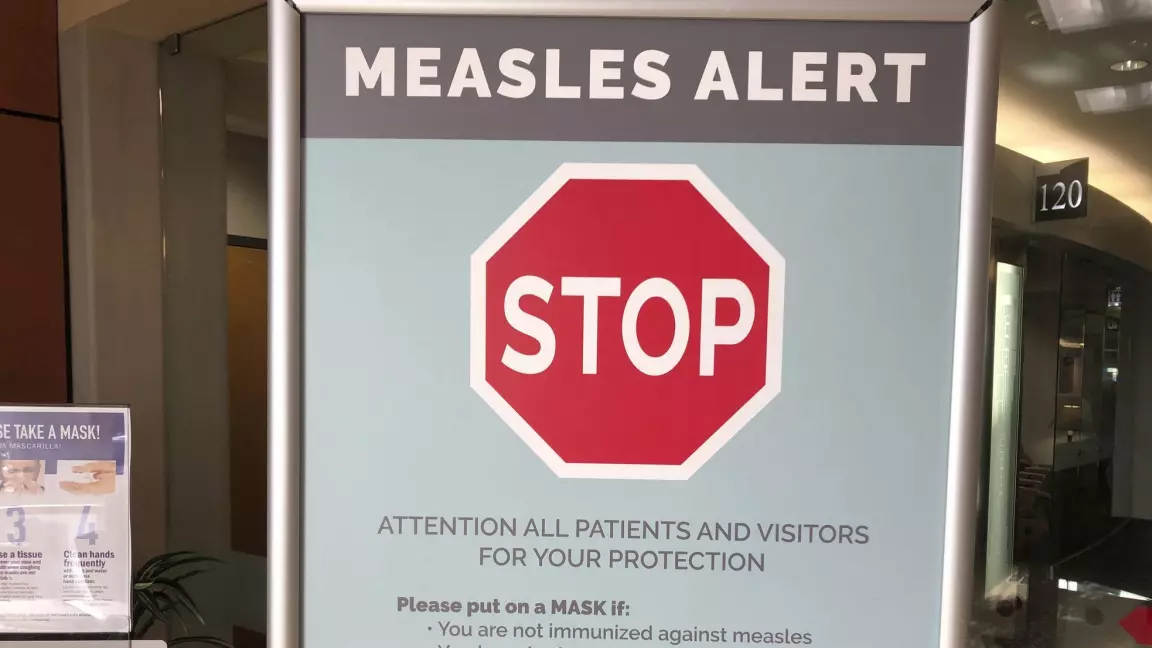Health
50 staff, nurses at St. Mary's hospital potentially exposed to COVID-19 – TheRecord.com

KITCHENER — More than 50 staff members at St. Mary’s General Hospital, including some nurses, were “at risk of potential exposure” to COVID-19 last week, says the hospital’s president.
Lee Fairclough said this potential exposure was discovered after the hospital learned of a patient’s positive test for the novel coronavirus on Thursday. Six staff who began showing symptoms were referred to public health for fast-tracked testing.
Fairclough’s comments were made in response to a news release from the Ontario Nurses’ Association (ONA), sent out late Saturday evening.
In that document, the president of the union representing Ontario nurses said more than 50 nurses were exposed to the coronavirus at St. Mary’s while caring for a patient.
A patient presented at the emergency department and was screened for influenza, but not COVID-19, said union president Vicki McKenna. This patient was not isolated and the nurses treating them were unable to access N95 respirators. The hospital “strongly discourages nurses wearing them,” she wrote.
The hospital’s president said some of the details in the ONA’s news release were not accurate.
“When a potential exposure occurs, we have a clear process to investigate it quickly,” Fairclough wrote.
Those who were potentially exposed but remain asymptomatic are not being tested because it is not believed the test would be effective, the hospital’s president said. Testing them also wouldn’t be following provincial guidelines.
On Friday evening, St. Mary’s received a call from the Ministry of Labour as a result of a complaint from the nurses association.
“We acknowledged it immediately and began to work through the concerns and continue to do so,” Fairclough wrote.
On March 12, the ministry visited the hospital to assess the organization’s preparedness for COVID-19 infection prevention and control. The administrative review of measures and procedures included personal protective equipment and appropriate access to it.
The ministry was satisfied with the hospital’s preparedness, Fairclough said in the release.
“I care about staff at St. Mary’s, and it has been my goal since starting as president in January to establish an open and collaborative environment,” she said, adding she invited the union president to call her at any time should she hear worries from staff.
In the ONA release, McKenna urged the hospital to ensure screening protocols are followed and proper protective equipment is worn.
“We just cannot afford to lose nurses now.”
On Thursday March 19, Waterloo Region learned of its first case of COVID-19 acquired through local transmission. A woman in her 20s who works at St. Mary’s hospital was at work while experiencing symptoms.
She developed symptoms on March 11 and was tested on March 13, then released to self-isolate at home the same day.
The woman was symptomatic while at work at St Mary’s on March 13. In an earlier interview, Fairclough said the woman is not involved in direct patient care.
cseto@therecord.com
Twitter: @SetoRecord
Twitter: @SetoRecord
Health
Quebec successfully pushes back against rise in measles cases – CBC.ca


Quebec appears to be winning its battle against the rising tide of measles after 45 cases were confirmed province-wide this year.
“We’ve had no locally transmitted measles cases since March 25, so that’s good news,” said Dr. Paul Le Guerrier, responsible for immunization for Montreal Public Health.
There are 17 patients with measles in Quebec currently, and the most recent case is somebody who was infected while abroad, he said.
But it was no small task to get to this point.
Le Guerrier said once local transmission was detected, news was spread fast among health centres to ensure proper protocols were followed — such as not letting potentially infected people sit in waiting rooms for hours on end.
Then about 90 staffers were put to work, tracking down those who were in contact with positive cases and are not properly vaccinated. They were given post-exposure prophylaxis, which prevents disease, said Le Guerrier.
From there, a vaccination campaign was launched, especially in daycares, schools and neighbourhoods with low inoculation rates. There was an effort to convince parents to get their children vaccinated.
Vaccination in schools boosted
Some schools, mostly in Montreal, had vaccination rates as low as 30 or 40 per cent.
“Vaccination was well accepted and parents responded well,” said Le Guerrier. “Some schools went from very low to as high as 85 to 90 per cent vaccination coverage.”
But it’s not only children who aren’t properly vaccinated. Le Guerrier said people need two doses after age one to be fully inoculated, and he encouraged people to check their status.
There are all kinds of reasons why people aren’t vaccinated, but it’s only about five per cent who are against immunization, he said. So far, some 10,000 people have been vaccinated against measles province-wide during this campaign, Le Guerrier said.
The next step is to continue pushing for further vaccination, but he said, small outbreaks are likely in the future as measles is spreading abroad and travellers are likely to bring it back with them.
Need to improve vaccination rate, expert says
Dr. Donald Vinh, an infectious diseases specialist from the McGill University Health Centre, said it’s not time to rest on our laurels, but this is a good indication that public health is able to take action quickly and that people are willing to listen to health recommendations.
“We are not seeing new cases or at least the new cases are not exceeding the number of cases that we can handle,” said Vinh.
“So these are all reassuring signs, but I don’t think it’s a sign that we need to become complacent.”
Vinh said there are also signs that the public is lagging in vaccine coverage and it’s important to respond to this with improved education and access. Otherwise, microbes capitalize on our weaknesses, he said.
Getting vaccination coverage up to an adequate level is necessary, Vinh said, or more small outbreaks like this will continue to happen.
“And it’s very possible that we may not be able to get one under control if we don’t react quickly enough,” he said.
Health
Pregnant women in the Black Country urged to get whooping cough vaccine – BBC.com


Pregnant women urged to get whooping cough vaccine
Pregnant women in the Black Country are being urged to get vaccinated against whooping cough after a rise in cases.
The bacterial infection of the lungs spreads very easily and can cause serious problems, especially in babies and young children.
The Black Country Integrated Care Board (ICB) is advising pregnant women between 16 and 32 weeks to contact their GP to get the vaccine so their baby has protection from birth.
The UK Health Security Agency warned earlier this year of a steady decline in uptake of the vaccine in pregnant women and children.
Symptoms of the infection, also known as “100-day cough”, are similar to a cold, with a runny nose and sore throat.
Sally Roberts, chief nursing officer for the ICB, which covers Wolverhampton, Dudley, Walsall and Sandwell, said anyone could catch it, but it was more serious for young children and babies.
“Getting vaccinated while you’re pregnant is highly effective in protecting your baby from developing whooping cough in the first few weeks of their life – ideally from 16 weeks up to 32 weeks of pregnancy,” she said.
“If for any reason you miss having the vaccine, you can still have it up until you go into labour.”
Follow BBC West Midlands on Facebook, X and Instagram. Send your story ideas to: newsonline.westmidlands@bbc.co.uk
Health
Measles cases stabilize in Montreal – CityNews Montreal


The number of measles cases has stabilized, according to the Montreal Public Health.
Since March 25, there have been no contaminations reported within the community.
“Our teams have identified all contact cases of measles,” said media relations advisor Geneviève Paradis. “It’s a laborious task: each measles case produces hundreds of contacts.”
All community transmission cases since February 2024 have been caused by returning travelers who were either unvaccinated or partially vaccinated.
Currently, there are 18 measles cases in Montreal – with 46 total in Quebec. This according to the April 18 figures from the provincial government.
“With the summer vacations approaching, if you’re travelling, it is essential to check if you are protected against measles,” explained Paradis.
According to Montreal Public Health, a person needs to have received two doses after the age of 12 months to be immunized against the virus.
They’ve launched a vaccination campaign throughout the region, and currently, 11,341 people have been vaccinated against measles in Montreal between March 19 and April 15.
Vaccination is also being provided in schools and at local service points.
“The vaccination operation is under the responsibility of the five CIUSSS of the territory,” concluded Paradis.
-



 Tech19 hours ago
Tech19 hours agoCytiva Showcases Single-Use Mixing System at INTERPHEX 2024 – BioPharm International
-
News21 hours ago
Tim Hortons says 'technical errors' falsely told people they won $55K boat in Roll Up To Win promo – CBC.ca
-



 Health15 hours ago
Health15 hours agoSupervised consumption sites urgently needed, says study – Sudbury.com
-



 Politics23 hours ago
Politics23 hours agoFlorida's Bob Graham dead at 87: A leader who looked beyond politics, served ordinary folks – Toronto Star
-



 Tech21 hours ago
Tech21 hours agoAaron Sluchinski adds Kyle Doering to lineup for next season – Sportsnet.ca
-



 Science23 hours ago
Science23 hours agoRecord breaker! Milky Way's most monstrous stellar-mass black hole is sleeping giant lurking close to Earth (Video) – Space.com
-
Media24 hours ago
Georgia’s parliament votes to approve so-called ‘Russian law’ targeting media in first reading – CityNews Kitchener
-



 Politics21 hours ago
Politics21 hours agoTrump faces political risks as trial begins – NBC News





